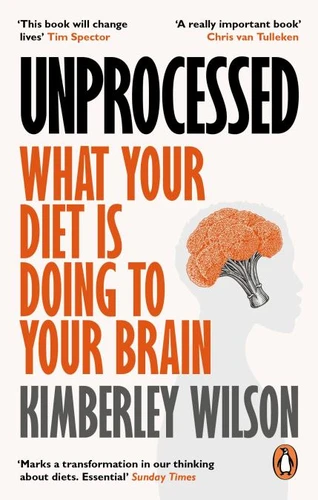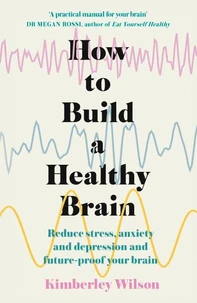Unprocessed. How the Food We Eat Is Fuelling Our Mental Health Crisis
Par :Formats :
Disponible dans votre compte client Decitre ou Furet du Nord dès validation de votre commande. Le format ePub protégé est :
- Compatible avec une lecture sur My Vivlio (smartphone, tablette, ordinateur)
- Compatible avec une lecture sur liseuses Vivlio
- Pour les liseuses autres que Vivlio, vous devez utiliser le logiciel Adobe Digital Edition. Non compatible avec la lecture sur les liseuses Kindle, Remarkable et Sony
- Non compatible avec un achat hors France métropolitaine
 , qui est-ce ?
, qui est-ce ?Notre partenaire de plateforme de lecture numérique où vous retrouverez l'ensemble de vos ebooks gratuitement
Pour en savoir plus sur nos ebooks, consultez notre aide en ligne ici
- Nombre de pages304
- FormatePub
- ISBN978-0-7535-5977-2
- EAN9780753559772
- Date de parution23/02/2023
- Protection num.Adobe DRM
- Infos supplémentairesepub
- ÉditeurVirgin Digital
Résumé
We all know that as a nation our mental health is in crisis. But what most don't know is that a critical ingredient in this debate, and a crucial part of the solution - what we eat - is being ignored. Nutrition has more influence on what we feel, who we become and how we behave than we could ever have imagined. It affects everything from our decision-making to aggression and violence. Yet mental health disorders are overwhelmingly treated as 'mind' problems as if the physical brain - and how we feed it - is irrelevant.
Someone suffering from depression is more likely to be asked about their relationship with their mother than their relationship with food. In this eye-opening and impassioned book, psychologist Kimberley Wilson draws on startling new research - as well as her own work in prisons, schools and hospitals around the country - to reveal the role of food and nutrients in brain development and mental health: from how the food a woman eats during pregnancy influences the size of her baby's brain, and hunger makes you mean; to how nutrient deficiencies change your personality.
We must also recognise poor nutrition as a social injustice, with the poorest and most vulnerable being systematically ignored. We need to talk about what our food is doing to our brains. And we need decisive action, not over rehearsed soundbites and empty promises, from those in power - because if we don't, things can only get worse.
Someone suffering from depression is more likely to be asked about their relationship with their mother than their relationship with food. In this eye-opening and impassioned book, psychologist Kimberley Wilson draws on startling new research - as well as her own work in prisons, schools and hospitals around the country - to reveal the role of food and nutrients in brain development and mental health: from how the food a woman eats during pregnancy influences the size of her baby's brain, and hunger makes you mean; to how nutrient deficiencies change your personality.
We must also recognise poor nutrition as a social injustice, with the poorest and most vulnerable being systematically ignored. We need to talk about what our food is doing to our brains. And we need decisive action, not over rehearsed soundbites and empty promises, from those in power - because if we don't, things can only get worse.
We all know that as a nation our mental health is in crisis. But what most don't know is that a critical ingredient in this debate, and a crucial part of the solution - what we eat - is being ignored. Nutrition has more influence on what we feel, who we become and how we behave than we could ever have imagined. It affects everything from our decision-making to aggression and violence. Yet mental health disorders are overwhelmingly treated as 'mind' problems as if the physical brain - and how we feed it - is irrelevant.
Someone suffering from depression is more likely to be asked about their relationship with their mother than their relationship with food. In this eye-opening and impassioned book, psychologist Kimberley Wilson draws on startling new research - as well as her own work in prisons, schools and hospitals around the country - to reveal the role of food and nutrients in brain development and mental health: from how the food a woman eats during pregnancy influences the size of her baby's brain, and hunger makes you mean; to how nutrient deficiencies change your personality.
We must also recognise poor nutrition as a social injustice, with the poorest and most vulnerable being systematically ignored. We need to talk about what our food is doing to our brains. And we need decisive action, not over rehearsed soundbites and empty promises, from those in power - because if we don't, things can only get worse.
Someone suffering from depression is more likely to be asked about their relationship with their mother than their relationship with food. In this eye-opening and impassioned book, psychologist Kimberley Wilson draws on startling new research - as well as her own work in prisons, schools and hospitals around the country - to reveal the role of food and nutrients in brain development and mental health: from how the food a woman eats during pregnancy influences the size of her baby's brain, and hunger makes you mean; to how nutrient deficiencies change your personality.
We must also recognise poor nutrition as a social injustice, with the poorest and most vulnerable being systematically ignored. We need to talk about what our food is doing to our brains. And we need decisive action, not over rehearsed soundbites and empty promises, from those in power - because if we don't, things can only get worse.




